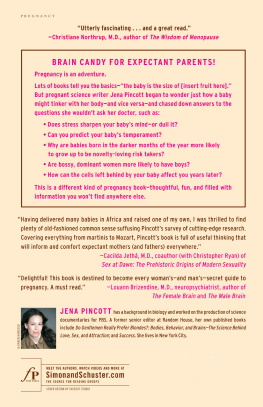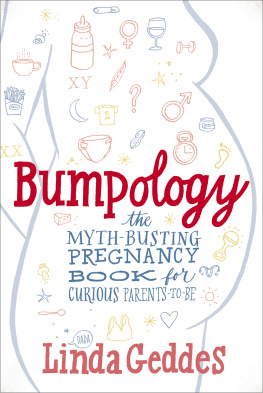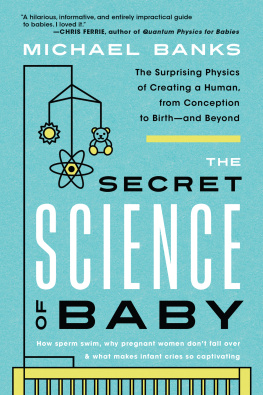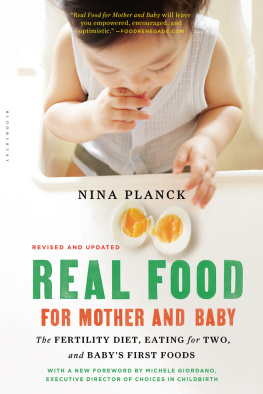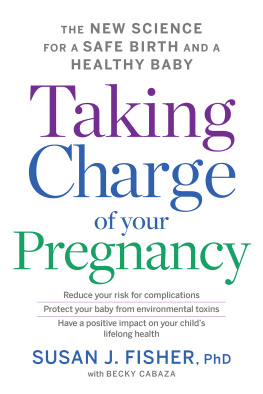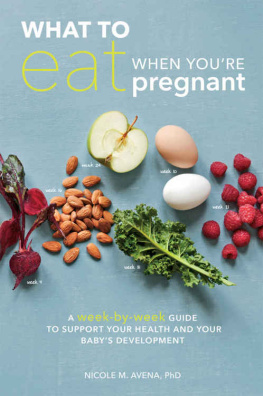


FREE PRESS
A Division of Simon & Schuster, Inc.
1230 Avenue of the Americas
New York, NY 10020
www.SimonandSchuster.com
Copyright 2011 by Jena Pincott
All rights reserved, including the right to reproduce this book or portions thereof in any form whatsoever. For information address Free Press Subsidiary Rights Department, 1230 Avenue of the Americas, New York, NY 10020
First Free Press trade paperback edition October 2011
FREE PRESS and colophon are trademarks of Simon & Schuster, Inc.
The Simon & Schuster Speakers Bureau can bring authors to your live event. For more information or to book an event contact the Simon & Schuster Speakers Bureau at 1-866-248-3049 or visit our website at www.simonspeakers.com .
Designed by Maura Fadden Rosental/Mspace
Manufactured in the United States of America
2 4 6 8 10 9 7 5 3 1
Library of Congress Cataloging-in-Publication Data
Pincott, J. (Jena).
Do chocolate lovers have sweeter babies?:
the surprising science of pregnancy / Jena Pincott.
p. cm.
1. Pregnancy. 2. Childbirth. I. Title.
RG525.P496 2011
618.2dc23 2011015005
ISBN 978-1-4391-8334-2
ISBN 978-1-4391-8335-9 (ebook)
To Una Joy,
without whom this book,
and many other things,
would not be possible
CONTENTS
STRETCH MARKS, SHRUNKEN BRAINS, AND A MOST SURPRISING SMELL
Science Behind the Symptoms
SKINNY CHICKS, BOSSY BROADS, AND A BASKETBALL IN THE BELLY
The Biology of Boy-or-Girl
FAT RATS, SALMON-AND-SOY SUPPERS, AND WHY GRANDMAS DIET MATTERS
Food and the Fetus
PUDGY HUBBIES, MAN BOOBS, AND A THEORY ABOUT THE DADDY GENE
A Daddyology
MAMAS BOYS, GREEDY FETUSES, AND WHY EVERYONE THINKS THE BABY LOOKS LIKE DAD
On Genes and Biases
FRAZZLED FETUSES, SNOOPING GENIUSES, AND WHY CHOCOLATE LOVERS HAVE SWEETER BABIES
Prenatal Predictors
EVES LEGACY, NIPPLE POWER, AND THE GOLDEN HOUR
Some Science of the Maternity Ward
MOMMY BRAIN, MOOD MILK,
AND THE WEIRD HALF-LIFE OF CELLS THE BABY LEFT BEHIND
A Postpartumology
LESSONS FROM THE LAB
A Summary of Practical Tips
INTRODUCTION
O ne spring night at the end of my second trimester, I dreamed my fetus ran away. I woke up to find myself in an embryonic curl, the curtains blowing and moonlight streaming in. As the ceiling fan above circled lazily, I remembered this: my renegade baby, pinkish-pale, dashing out into a delicate and infinite landscape; the irresistibly charming little imp hooting and hollering and kicking the cancan; and me in hot pursuit, bumbling and breathing heavily.
Every pregnant woman has body and self taken over by a chthonian force beyond her control, wrote the feminist writer Camille Paglia. The so-called miracle of birth is nature getting her own way. I fear shes right. I feel my conscious, rational self isnt calling the shots anymore. Im inhabited by urges and appetites that are not my own. Ive asked myself: Im not in control, so who is?
Its the fetusat least in some ways, some of the time. The little ones manipulate us long before theyre born. This helps explain some pregnancy weirdness, like how we might turn up our noses at delicacies we once loved (good-bye bitter greens, sayonara sardines) in favor of the sweet or simple foods of childhood. Some of us find ourselves desperately drawn to all that is safe and familiar. Why the eagerness to bond with our mothers, siblings, and girlfriends? When did we lose our edge, finding ourselves less open and even distrustful of the foreign and exotic? Why do we suddenly read fear, anxiety, and anger so often and easily on other peoples faces?
Hormones are behind these developments. But whos behind the hormones? Its the unborn baby and her ambassador, the placenta. Changing Moms behavior is a fetuss way of protecting her own interests: safety, food, and health.
I started researching this book before I got pregnant, wrote it as my baby girl grew inside me, and finished it several months after her birth. The nine chapters roughly span this time. A science writer and an expectant mom, I had been gripped by questionssome practical and others whimsical, some classic and others cutting edgeinvolving the science of pregnancy: Why are my dreams so vivid? Might what I eat now affect the babys tastes in life? Is stress sharpening my babys mind or dulling it? Could there be a hidden reason we conceived a girl and not a boy?
More and more questions bubbled up as the months passed. I ask whether pregnesia, or pregnancy amnesia, is for real. I explore whether theres a Daddy Gene and what shapes maternal instinct. I question what they say about newborns looking like their dads. I wonder if its possible for my husband to nurse the baby. And by the way, are breast-fed babies really brainier? For answers, Ive looked to hundreds of peer-reviewed studies and the researchers behind them. Evolutionary psychology, biology, social science, neuroscience, reproductive genetics, endocrinologythese scientific disciplines all touch on pregnancy, and I draw on them generously.
The science got weirder as I got rounder. I learned reasons that a partners odor might turn us off and why to have sex with him anyway. Expectant fathers often find themselves plumping up and even puking, conditions triggered by their hormones. What triggers these hormonal tides? Its probably usour behavior, or even our odor carrying chemical messages we produce only when pregnant.
A pregnant woman has more power than she realizes. Our ancestors believed that what we think, eat, and otherwise experience in pregnancy influences the baby in the womband theres increasing evidence its true. Newborns are not blank slates. This is why scientists find its worth investigating whether a womans prenatal chocolate consumption might sweeten her babys temperament, why kids are born favoring their mothers tastes and mother tongue, and how an expectant mom who keeps her competitive edge might sharpen her unborn babys mind. The mothers sway over the fetus may begin at the moment of conception, or even beforehand, as I explore in the pages to come. Why else would bossy broads have more boys? And why do skinny chicks have more girls?
This book taps into the fascinating new field of epigenetics, the influence of environment on the behavior of genes. Recent studies in this emerging science reveal how blood sugar, stress and hormone levels, exposure to toxins, and even certain experiences alter how an unborn babys genes behave without changing their underlying sequence. Epigenetics explains why babies of overeating moms, having developed in a womb larded with sugars and fats, may grow up to be hungrier, heavier, and more easily harried than theyd be otherwise. It gives insight into why its foolish to frazzle a fetus, why smoking and starvation wreak havoc, and why our maternal instincts depend in part on how we moms were treated in babyhood. An epigenetic effect may even echo through the generations. If you ate a high-fat diet during pregnancy, for instance, your kids and grandkids might inherit a predisposition to diabetes. The dietary decisions your mother made when you were little more than an embryo could affect your baby too.
Next page
